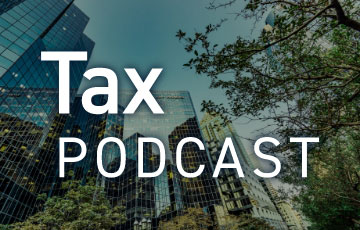Download Your Year-end Tax Planning Checklist
As 2025 draws to a close, now is the time to schedule a meeting with your tax advisor to discuss year-end tax planning. With significant tax reform introduced this year through P.L. 119-21, or the “One Big Beautiful Bill Act,” you may be able to take advantage of new or enhanced provisions.
To help you prepare, we have created a downloadable guide with key considerations and action steps for 2025, as well as a look ahead to 2026 planning. Cherry Bekaert’s team of tax advisors looks forward to working with you, your family and your business to streamline your year-end planning.
Questions To Begin Your 2025 Planning
Before you start on your 2025 taxes, take the time to answer the following questions to determine which life events, if any, may impact your filing:
- Have you experienced significant life changes this year, such as marriage, divorce, retirement, relocation, job changes or new family members?
- Have there been significant transactions this year, such as new investments, inheritances, casualty losses, or business successes or failures?
- What capital gains or losses can be realized before year-end?
- Do you make charitable contributions?
- Do you receive income from a pass-through business?
- Are there carryover losses, deductions or transactions from 2024?
- Will your income change significantly in 2026?
Review 2025 Tax Reform Provisions
There are a few notable tax reforms that could change your year-end planning, including:
- Standard Deduction: The standard deduction, or the income you can exclude from taxes before respective tax rates apply, was increased to $15,750 for single filers and $31,500 for joint filers.
- Itemized Deductions: The 2025 tax reform permanently repealed miscellaneous itemized deductions, as well as the “Pease” limitation, while the limitation on mortgage interest was permanently extended. A new overall limitation on the tax benefit of itemized deductions was introduced, with a 35-cent cap on the value of each dollar of allowable itemized deductions for individuals in the highest tax bracket.
- SALT Cap: In 2025, the state and local (SALT) deduction cap increased from $10,000 to $40,000, which may prove impactful for residents in high-tax states. Accelerating property tax payments and state estimated taxes into 2025 can be a strategic move to take advantage of this cap expansion.
Develop Your Tax Planning Roadmap
While individual year-end planning strategies differ, and you have your own unique tax position, there are a few common action steps to consider as you begin. To build your roadmap, review the comprehensive list of steps in our downloadable guide and see which actions apply to your situation.
For example, you can consider whether you can decrease your tax bill by shifting income or deductions between 2025 and 2026. Or you may consider gain deferral by investing in a Qualified Opportunity Zone Fund, a program that was made permanent by P.L. 119-21, with additional benefits and new zones rolling out in 2027.
Tax Planning With Retirement Savings
The 2025 tax reform did not impact retirement account contributions. The limit on annual contributions to a traditional or Roth individual retirement account (IRA) is still $7,000, and the maximum contribution to most defined contribution plans (e.g., 401(k) plan) is $23,500. For participants in 401(k), 403(b), and governmental 457 plans, the catch-up contribution limit increased to $11,250 for those aged 60, 61, 62 and 63 in 2025.
Consider ways to prioritize your retirement savings during year-end planning, such as maximizing contributions to your IRA, profit sharing, 401(k) and employer retirement savings plans.
Gifts and Estate Planning
Starting in 2026, the unified lifetime gift, estate, and generation-skipping transfer exemption will be set at $15 million per individual ($30 million per couple) and indexed for inflation. Combined with the annual gift tax exclusion at $19,000, individuals have the potential to strategically plan and reduce future estate taxes.
Charitable giving limitations also take effect in 2026, meaning only gifts that exceed 0.5% of Gross Adjusted Income will qualify for deduction. Grouping or bunching charitable contributions can help taxpayers maximize qualifying deductions. As you look ahead, be sure to refresh your estate plan and consider making annual exclusion gifts before December 31.
Advice for Final 2025 Tax Payments
When it comes time to make your 2025 tax payment, don't forget to confirm the following:
- Withholdings and Estimated Taxes: Review year-to-date income tax withholding and estimated taxes to avoid underpayment penalties or overpayment in April 2026.
- Adjustments: Consider adjusting tax withholding from wages or IRA required minimum distributions (RMDs) to better align with your tax liability.
- Electronic Payments: Make electronic deposits of federal and state tax payments for convenience and accuracy.
- 2026 Estimated Payments: Consider calculating first-quarter 2026 estimated tax payments to stay ahead of your tax obligations.
Your Guide Forward
Reach out to your Cherry Bekaert tax advisor to initiate your year-end tax planning or for help with any questions related to our planning checklist.
Related Insights
- Webinar Recording: 2025 Year-end Tax Planning for Individuals
- Webinar Recording: 2025 Year-end Tax Planning Strategies for Businesses
- Article: 4 Year-end Tax Planning Steps Businesses Can Take Before 2026








